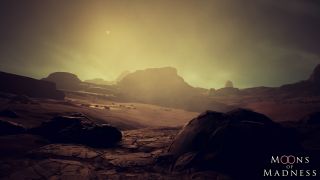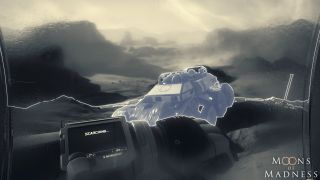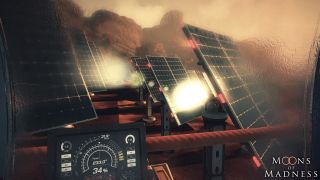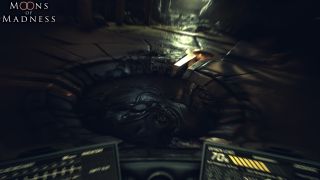This horror game set on Mars aims to separate real mental illness from Lovecraftian madness
Moons of Madness is a first-person adventure trying to bring some humanity (and space dust) to the classic horror mythos.

I wonder what Lovecraft would think of space travel. Would the Cthulhu mythos feel too pedestrian for him, what with an infinite vacuum out there? Makes a fourth-dimensional creature look like a cockroach in perspective. Then what are humans? Microbes? Plastic bags in the wind? Windless plastic bags? Oh god.
It’s that nesting doll of intangibles that Moons of Madness is shooting for, a first person game about a family’s battle with mental illness set inside a Lovecraftian horror story, itself set within a sci-fi adventure on Mars. And while they don’t intend on becoming the de facto depiction of mental illness in the medium, the developers at Rock Pocket Games want to portray it realistically. In parsing a family’s genetic inclinations from genuine cosmic horrors, the main character will ideally come to know their illness better, and become more capable of navigating otherworldly terrors as a result. After a short hands-on demo with a vertical slice of Moons of Madness, I’m inclined to believe they’re on the right path.
The man on the moon, which is Mars, not the moon
Moons of Madness plays like Gone Home with gadgets and hallucinations. My demo starts me in a rover on the surface of Mars. The rover breaks down, rolls to a stop, and I hop out to pop the hood open—and in the future you can pop the hood open using a fancy armband computer. With a quick scan that reminds me of Metroid Prime, objects I can interface with light up in the environment. Selecting a device displays information about its function or lets me interface with it remotely. Someday, we’ll pop open microwave ovens from across the world. The hood is a small compartment housing a power cell, which is dead, to my surprise. Luckily, I broke down near a power station that charges these very same cells.

I head to the front of the vehicle and pull out a charging cable, but it doesn’t even get close to reaching far enough. The future societies in Moons of Madness have learned nothing from pack-in phone charging cables, it seems. So I trudge up a hill in my big space suit with an empty power cell in tow, jogging a bit along the way. My visor fogs up, sharpening the various scratches and dents from heavy use against my own hot breath. It’s a lovely effect that makes me think of Metroid Prime again. I like to think about Metroid Prime, apparently.
A quick scan shows the power station isn’t getting power anyway, and clues me into three sets of solar panels that just need a small adjustment to get the good sun juices flowing again. Easy. I make my way over between the rusty red hummocks to the first station. All the while, a colleague chats with me over remote voice comms, telling where I need to go and responding to my character’s commentary. It’s possible to skip most of the dialogue by ignoring the ‘response’ prompts that pop up after my colleague updates me on the situation, but I usually partake anyway. The voice-acting isn’t top tier stuff, but the writing is a lighthearted human backdrop for whatever horror eventually rears its indescribable head.

To position the panels, I interface directly with a computer, adjusting their X and Y axes until a meter measuring sunlight absorption turns green. My oxygen reserves start to run low while I’m at work, but a nearby refill station keeps me breathing. (Hopefully that's not a nuisance later.) So far, my demo has been dotted with instances where I need to fiddle with somewhat plausible future tech. None of it is very exciting, but they’re satisfying interactions that go a long way in establishing my role as a future Martian. Good horror sets the table first.
I get two sets of panels adjusted without issue, but the third’s console is out of reach, on a platform without stairs, probably torn to bits by a dust storm. No problem. After a quick scan, I interface with the console remotely, adjusting the panels from far below. But once I finish up, my cool armband computer glitches out and flashes something strange across the screen I don’t have time to read. Weird, thinks my in-game persona. Weird, but I’m not surprised, this is a horror game after all, thinks my real, seasoned pro-gamer self.
The biggest gaming news, reviews and hardware deals
Keep up to date with the most important stories and the best deals, as picked by the PC Gamer team.
When the moon hits your mind’s eye
Things start to get expectedly wacky from there, but I’m assured by the devs guiding me that the final game will have a much slower, more subtle ramp into madness. First, comms go out. And then I make my way back to the rover, but a tunnel winding down beneath the surface appears out of nowhere and I’m beckoned into it by my stupid curiosity and an eerie call.
My character hears their mother speaking in sharp, snappy bouts. It’s hard to make out what she’s saying, but it’s enough to warrant more spooky spelunking. Eventually I reach a chamber with a small pool of black ooze at its center. An astronaut with a cracked visor climbs out, grabs me, and disappears. The plain, unceremonious presentation makes the vision hit harder. I can’t help but feel like it’s an awful sign of things to come. Avoid scary black puddles in future, I note.

We continue down the tunnel, following the troubled voice. The tunnel transitions from natural rock formations into continual ribbed arches with eyes carved all over. And then the ribbing gives way to wood paneling, windows, a door—we’re in the corner of a house and a woman faces away from us, muttering. It’s his mother, as expected. She’s holding a knife, and as we inch closer, she swings around and plants the blade deep into his abdomen. The scene dissolves and we’re back at the solar panels laying on our side with a jagged fragment from one of the panels sticking out of our belly. Clearly, this guy has some stuff to work through.
Again, I’m told that the path to this kind of episode will be much slower, informed by clearer characterization of the player’s family history. Rock Pocket doesn’t want to make a horror game with sanity meters or health packs, and it’s hinted that while some might be able to conquer or cope with terror, there will always be more waiting beyond the veil.
Even scarier than a vision of your mom stabbing you or an awful creature chasing you through a darkened hallway is knowing yourself completely, flaws and all, and still finding there's more to existence than you can comprehend.
I just hope those horrors don’t consist of frustrating stealth sequences, because I’m told stealth is definitely a factor later on. Player death isn’t always the best way to sustain tension and we’ve already snuck our way through nearly every imaginable horror setting there is. I’m more interested in the idea of a person attempting to separate their mental illness from cosmic horrors, weaving in a human condition that plenty of Lovecraftian and horror stories in general have cheaply exploited in order to produce easy scares on a whim.
Even scarier than a vision of your mom stabbing you or an awful creature chasing you through a darkened hallway is knowing yourself completely, flaws and all, and still finding there's more to existence than you can comprehend. When something else like that takes the wheel, on Mars or anywhere—that’s true horror. Also, locking your keys in the car while it's running. That's also true horror.
As much as a brief demo for a slow burn narrative can’t stand on its own, the focus on communicating horror through character and the real effects of mental illness in a plausible future setting is enough to keep my interest. When Moons of Madness releases, we’ll let you know how that ambition pans out.
James is stuck in an endless loop, playing the Dark Souls games on repeat until Elden Ring and Silksong set him free. He's a truffle pig for indie horror and weird FPS games too, seeking out games that actively hurt to play. Otherwise he's wandering Austin, identifying mushrooms and doodling grackles.
Most Popular



